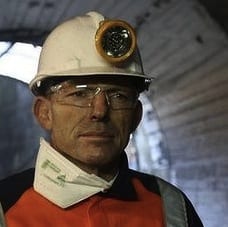Citigroup, the global investment banking giant, has written a savage criticism of Australia’s Direct Action climate policy stand, essentially describing it as useless and expensive, and suggesting it could cost $15 billion a year to meet the sort of emissions reduction targets being mooted for the Paris climate talks.
An analysis written by senior analyst Elaine Prior also dismisses the Abbott government’s emissions reductions targets paper, released in late March, suggesting that it appears to be setting the stage for an unambitious post-2020 target, designed to protect fossil fuel producers and the electricity sector, and discourage a move to a lower carbon world.
“We suspect the Government will be inclined to commit to the least stringent target it can justify, but presumably will commit to further reductions beyond the current target for 2020 of 5% below year 2000 levels,” Prior writes in the report.
“While a low level of “ambition” may protect Australia’s fossil fuel producers, electricity sector, and related industries, it may discourage industry from adapting to a lower carbon world. Long-term investors who see climate change posing a risk to the economy and thus to their investments, may consider a low level of ambition to be contrary to their interests.”
Prior is also particularly savage on the Direct Action policy, and its centrepiece, the emissions reduction fund and the s0-called safeguard mechanism, which essentially allows for major polluters to increase their emissions without penalty, and seek taxpayer funds for any reductions.
“Direct Action looks an expensive long-term approach for the taxpayer,” Prior writes.
“It appears to us that the mechanism, as described in the consultation paper, is unlikely to impose any significant costs or constraints on companies. However, it also appears unlikely to make any significant positive contribution to Australia’s emissions reduction efforts, or to encourage transition to a carbon constrained world.”
The Abbott government has indicated it will continue to use Direct Action in the medium to longer term, refusing to countenance a return to a “carbon price.” But most independent analysts believe this to be ridiculous, and Citigroup appears to agree.
“We do not believe this can be a sustainable long-term approach, given the expected increasing size of the “abatement task”, Prior writes.
“For example, on the figures above and assuming a no doubt unrealistically low abatement cost of $10 per tonne in today’s dollars, the annual cost in 2030 would be $1.9 billion to $3.9 billion in today’s dollars.”
“If the abatement cost could be contained at $20/t, the task would cost $3.9 billion to $7.8 billion, with double the cost at $40/t. Abatement costs will probably rise significantly over time, as low-cost options are used first, and marginal abatement costs increase, depending on technology progress.
“In reality, by 2030 the world will likely have made substantial emissions reduction efforts. To us, taxpayer-funded Direct Action does not appear to be a sustainable approach to the issue.”
But Prior also says that the government is being subject to intense lobbying, but notes that investors are now querying the funding of that lobbying power, and its intentions. And she drew particular attention to the activities of the Minerals Council of Australia.
“Investors may observe that companies are members of industry associations, or fund think tanks, which appear to be obstructing progress with regulation to constrain carbon emissions, despite those same companies making public statements in support of the need for action to address climate change.
“In Australia, while the issue has already been raised, BHP and Rio Tinto might be queried more extensively over the stance of the Minerals Council of Australia, and some of the programs it funds.”









